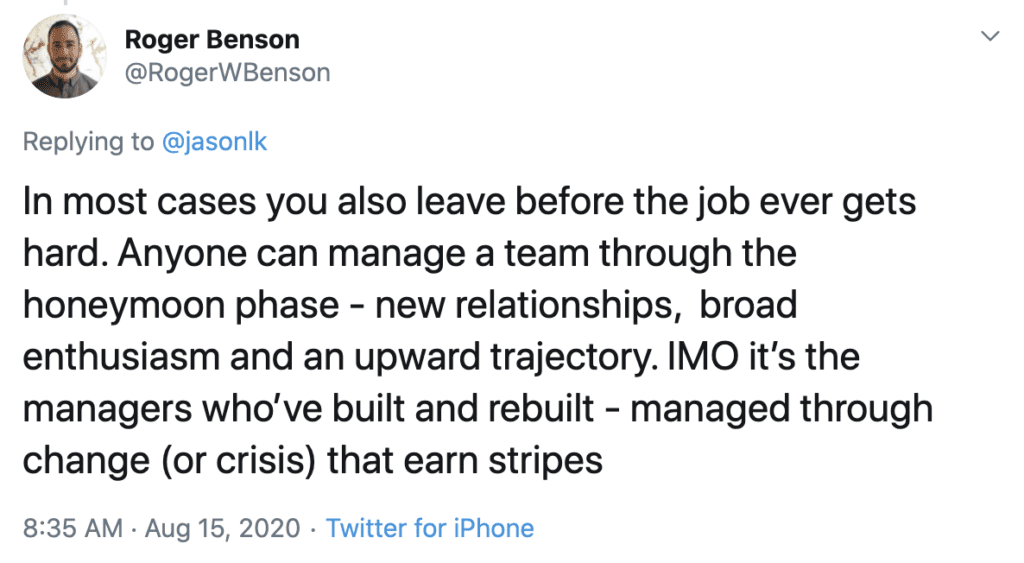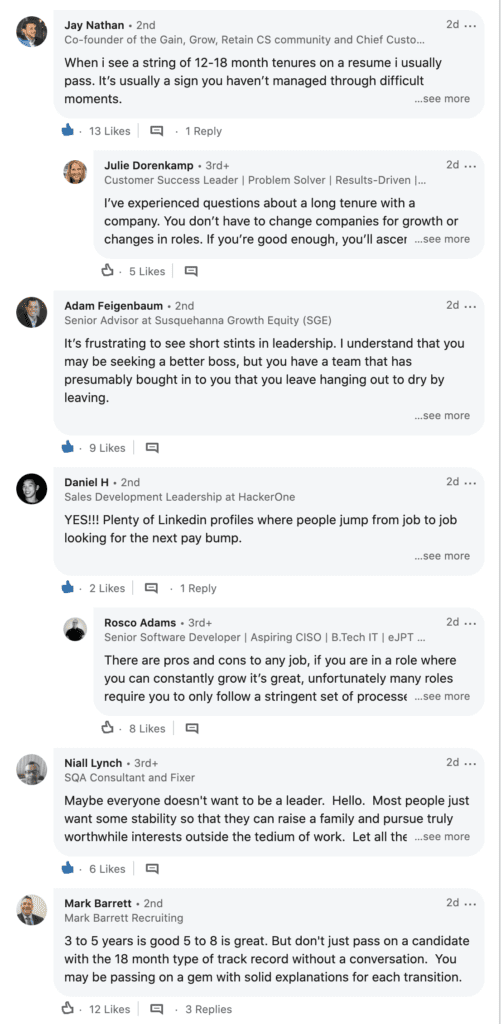I think the average "manager" level tech hire sort of plans on staying 18 mos. Long enough to get settled, learn a bit, then find something "better
Makes sense, but:
1/ You'll never make any $$
2/ You'll never truly grow
3/ You'll never see it play out
4/ You'll never get great— Jason ✨BeKind✨ Lemkin ⚫️ (@jasonlk) August 15, 2020
If you squint as you read TechCrunch, you’ll notice a pattern in a bunch of articles about Hot Startups. “Bob worked at Pinterest for 8 months before he …” or “after a stint as senior something engineer at Facebook [12 months], Bill joined …” etc. etc. It’s the one-year job culture.
The rise of the engineer with highly portable job skills, and essentially zero percent unemployment for any top 20% developer, is in many ways a great thing. While not so great for employers, this one-year-job culture is seemingly a win for engineers — it has empowered especially younger engineers in many new ways, created an implicit safety net which enables risk taking (not a huge deal to quit if you’ll only be unemployed for negative 7 days), led to salary growth, etc. Even talent auctions to the highest bidder. And doing something new every year, especially when you are young or young at heart, can be exciting. And because talent is so over hired (Google hiring 3,000 new engineers a year, Facebook over a 1,000, every hot startup hiring like mad) — the stigma to job hopping has been lost.
And job hopping has come to sales, too. So many AEs trying to quickly make the move to a VP of Sales role. So many folks that want to skip steps, and ask for the moon.
It’s not all day. These are the Best of Times in SaaS and Cloud. But it comes with a negative side. Yes, if you stay for a year, you may vest into a bit of stock. And it might even seem like, if you quit after you hit your cliff, and do another start-up, you’re collecting more stock from more companies, and you might do better this way. But that’s wrong:
- First, obviously if you leave before Year 1, you get no stock at all. Keep leaving and leaving and you may get nothing.
- More importantly, even if you leave at Day 366 (i.e., getting to your cliff), you won’t really get 25% of your stock. That’s because if you are good, as long as the company you are at is under a few hundred employees — you’ll get more options. Either you’ll get promoted and get more options (promotions are quick in a start-up if you are a rockstar), or you’ll get more options because in a start-up, you can easily be appreciated if you rock. So really if you leave after Year 1, you’re probably only getting 15% of your total expected options.
- If the basis/strike price is other than nominal, you have to pay to buy your stock. And it may be too expensive to buy all of it when you leave. This is a downside of the monster, high valuation rounds these days (combined with the relatively modest discounts for common stock to preferred since the mid’00s). In which case, you’ll end up with nothing. If you stay through a liquidity event, this issue goes away. More on this problem here.
- If you get RSUs instead of options, in some cases, you may get nothing when you leave anyway pre-liquidity event.
- If you don’t stay at least 3 years, it’s hard to get a “double promotion”. I.e., from IC to manager to director. Or manager to director to senior director, etc. The second promotion is both when you start to really build leadership skills. And in many cases, when your equity and cash comp accelerate.
Beyond stock and other economics — you’ll never really grow as a manager or leader if you don’t stay. It takes one year just to figure it all out, and a good chunk of the second to build a great team. By the third year, you have a machine. The fourth year, you are a real owner of the future of the business, whatever your exact level on the management org chart. You’re a veteran who has done it all, built a great team, made a lot of mistakes, talked to 100 or 1000 customers, and knows now … how to hit $100m in ARR, even if you are still a ways away. Leave early, and you’ll just never get this experience. Leave after 4 years of growth, of promotions, of hiring and firing, and lessons learned … and you leave a master of the universe.
We could easily make a longer list of other reasons to stay longer than a year (notice you never see sales guys — who run on cash — that are killing it leave after a year). And if you have a stupid boss, or are at a losing company, you gotta go. But if you always leave after a year … not only will you never grow in your career … you’ll never make any money …
(note an updated version of a Classic SaaStr post)



